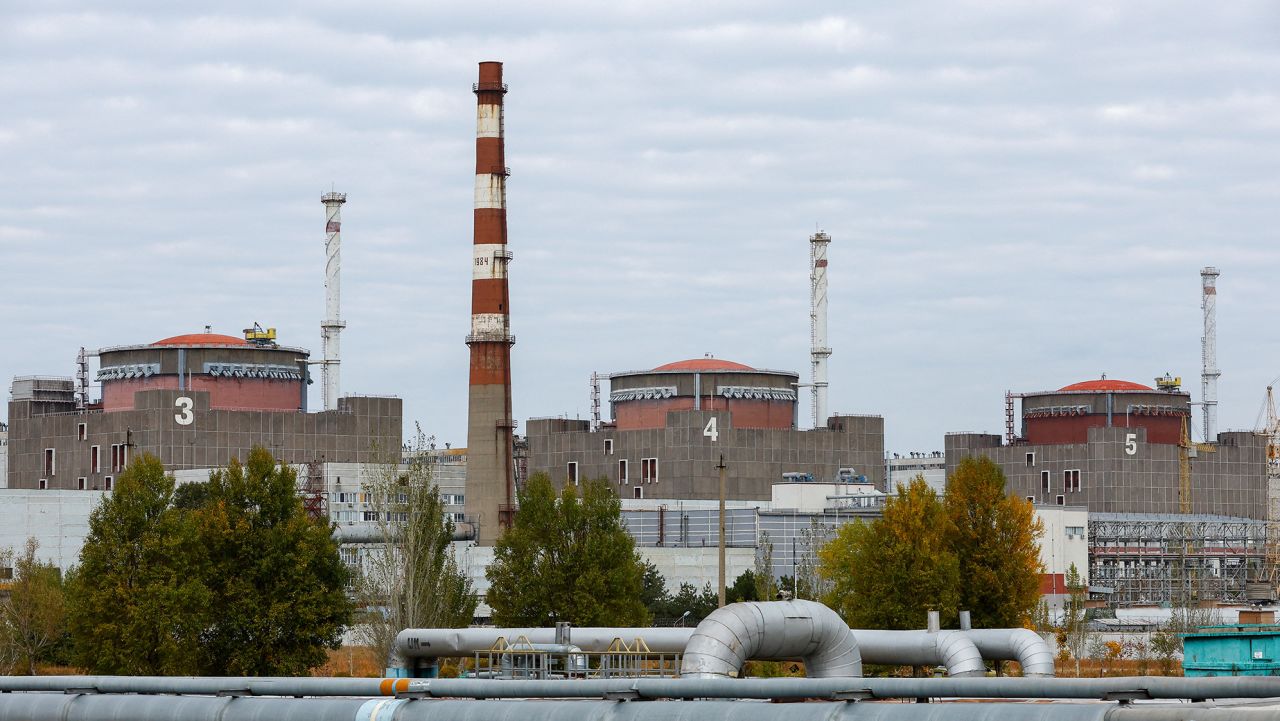Top 5 producers and consumers of nuclear energy 2:05
London (CNN) --
Much of Russia's energy exports have taken a hit from Western sanctions since the country launched its full-scale invasion of Ukraine, with one notable exception: nuclear power.
Rosatom, Russia's state nuclear power monopoly that exports and enriches uranium, and builds nuclear power plants around the world, controls Europe's largest nuclear power plant in the Zaporizhia region of Ukraine since Russian forces took it over last year. one year.
Nuclear energy in the world: how many reactors does each country have?
Kyiv has accused Russian forces of turning the complex into a military base and using it as a shield to launch attacks, knowing Ukraine cannot return fire without risking hitting one of the plant's reactors.
Ukraine has also blamed Russia for the explosions that occurred at the complex late last year.
Petro Kotin, interim president of the Ukrainian atomic energy company, Energoatom, is concerned about the militarization of the plant, but also about a significant reduction in qualified personnel at the facility.
The plant's Russian press service told CNN that new employees are being recruited, "which guarantees [its] safe operation."
If something happens, Energoatom "cannot really step in and mitigate any consequences or alleviate any emergencies" because Russia controls the territory, Kotin said.
"We are playing with fire," IAEA chief warns of hostilities near Zaporizhia nuclear plant
Despite what Kotin described as the growing risk of an error or breach of security protocols at the Zaporizhia plant, and repeated calls from Kyiv for sanctions on Rosatom, the Russian company remains largely unscathed, although the UK sanctioned its top management and several subsidiaries last month, and Finland rescinded a power plant deal last May.
advertising
Experts say Rosatom remains protected by the vital role it plays in global nuclear power and the fact that it cannot be easily replaced.
The problem is a "Russian doll of interlocking dependencies," says Paul Dorfman, chairman of the Nuclear Consulting Group and a longtime adviser to the UK government and the nuclear industry.
For starters, Rosatom is a key exporter of nuclear fuel.
In 2021, the United States relied on the Russian nuclear monopoly for 14% of the uranium that powered its nuclear reactors.
European utility companies bought nearly a fifth of their nuclear fuel from Rosatom.
According to Dorfman, the European Union has made little progress since it disassociated itself from the Russian nuclear industry.
Rosatom also provides enrichment services, accounting for 28% of what the United States needed in 2021. It has built numerous nuclear power plants around the world, and in some cases financed their construction.
As of the end of 2021, nearly one in five nuclear power plants in the world were in Russia or Russian-built, and Rosatom is building 15 more outside Russia, according to Columbia University's Center for Global Energy Policy.
Kacper Szulecki, a research professor at the Norwegian Institute of International Affairs, says that the cost of building a nuclear power plant is so high that it can only be financed by governments, and in some cases even they cannot afford it.
In such cases, Rosatom has often intervened, offering credit lines guaranteed by the Russian government and, in some cases, long-term contracts to supply fuel or even run the plant.
Szulecki, co-author of a recent study on the Russian nuclear industry, says the most extreme of these types of deals is the build-operate model.
Rosatom first used it with Turkey's Akkuyu power station, which the corporation is fully building and financing and has committed to operating throughout its useful life.
The Akkuyu nuclear power plant continues its construction in November 2022. Credit: Serkan Avci/Anadolu Agency/Getty Images
This dependency may take precedence over other considerations.
For example, Hungary has been the European Union country that has most opposed the sanctions against Rosatom.
It is also one of the few EU countries that rely on nuclear power for more than 40% of its electricity and has a long-term financing agreement with Rosatom to build a nuclear power plant.
Finding new suppliers to replace Rosatom in the global nuclear industry would take years, experts say.
Perhaps for this reason, far from dissuading future customers, the occupation of the Zaporizhia plant by Rosatom has coincided with a growth in the company's income abroad.
Its CEO, Aleksey Likhachev, told the Russian newspaper Izvestiya in December that foreign revenue was on track to increase by around 15% in 2022 compared to 2021.
For his part, Energoatom's Kotin believes that Rosatom is maintaining the plant's equipment so poorly that the Russian occupation may cause irreversible damage.
If it continues for another year, "then I'm sure we won't be able to get this plant up and running again," he said.
Diplomatic efforts to return control of the plant to Ukraine have stalled, Ukraine's Energy Minister Herman Halushchenko said over the weekend.
Russia has repeatedly accused Ukraine itself of bombing the Zaporizhia plant, and in an email to CNN, Rosatom's press service for the plant denied that heavy military equipment was on the site.
Nuclear powerNews from Russia













